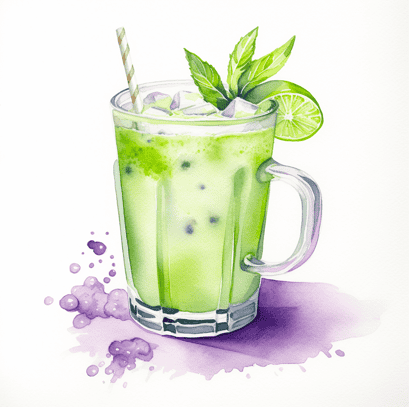
How much caffeine is in Thai tea? If you’re indulging in this popular iced drink, knowing its caffeine content is essential, especially since too much could impact your skin and energy. Let’s dive into the colourful world of this staple of Thai street food culture to ensure you enjoy every sip without concern.
Hi, I’m Hazel
I gave up on skincare after years of issues with acne and sensitive skin.
But after going plant-based, my skin cleared up and even started to glow. Now I help women reveal their natural beauty with simple, delicious plant-based food.
I also used to be a nurse, and love nerding out on nutritional science (high-quality science, that is).

As usual, this post is based on the strongest nutritional evidence I could find with a focus on the simplest, most delicious foods
…because who has time to waste on actions that don’t work?
The quick version:
The caffeine content in Thai tea varies depending on the specific blend and brewing method, but typically, a cup of traditional Thai tea contains about 30-60 milligrams of caffeine. For a lighter option, Thai Green Tea generally has less caffeine, making it suitable for those who are sensitive to caffeine effects.
Types of Thai Tea
Stepping into a Thai restaurant can introduce you to a range of Thai tea options, each with a distinct taste and ingredients list:

- Traditional Thai Tea: A robust mixture of black tea and Thai spices, like star anise and sometimes tamarind seed, coloured with a bit of dye to achieve its signature look. This is authentic Thai tea with complex flavours.
- Thai Green Tea: Using green tea instead of black, offering a lighter, more refreshing taste.
- Thai Lemon Tea: This tangy variant mixes black tea with a splash of lemon, perfect for hot days.
- Thai Coconut Tea: Substituting sweetened condensed milk with coconut milk for a tropical twist.
- Organic Thai Tea: Focuses on clean, pesticide-free tea leaves and natural ingredients.
Each type brings a unique flavour and a different amount of caffeine, making them suitable for various preferences and dietary considerations.
How Caffeine Content Varies

Understanding the exact caffeine content in each cup of Thai tea makes it easier to manager your caffeine intake. However, several factors make pinpointing this amount difficult:
Variability in Tea Blends
Thai tea can be made from a variety of tea blends, each with different levels of caffeine.
Traditional recipes often use a strong black tea or a blend of black tea, which naturally have higher caffeine contents. However, the exact type of tea leaves used (like Assam, Ceylon, or others), their blend ratios, and their origin can significantly alter the caffeine levels.
Preparation Methods
The way Thai tea is brewed also affects its caffeine content.
Factors such as water temperature, the amount of tea used, and the steeping time all play a role.
A longer steep time generally extracts more caffeine from the leaves. Therefore, even if two cups of Thai tea use the same type of leaves, variations in brewing can lead to different caffeine levels.
Addition of Other Ingredients
Thai tea is known for its unique flavour, which is enhanced by the addition of spices like star anise and tamarind seed, or even orange blossom water.
While these ingredients don’t contain caffeine, their proportions in relation to the tea leaves can affect the overall concentration of tea per cup, thus influencing the caffeine content indirectly.
Commercial Thai Tea Mixes
Many restaurants and cafes use pre-made Thai tea mixes, which can include varying amounts of tea leaves, flavourings, and colourings. The caffeine content in these mixes can vary widely depending on the manufacturer and the specific formula they use.
Caffeine Content in Different Thai Teas
Given the complex factors influencing caffeine content in Thai tea, it’s helpful to look at how these factors play out across different varieties of Thai tea.

Traditional Thai Tea
Known for its higher caffeine content, thanks to the strong black tea or sometimes a blend of black tea used.
It generally contains about 30-60 milligrams of caffeine per cup. It should still be less caffeine than a cup of coffee.
This type is perfect for those who enjoy a robust flavour and need a more substantial caffeine boost.
Thai Green Tea
Generally offers less caffeine, usually ranging from 20-45 milligrams per cup. This makes it a lighter option for caffeine-sensitive individuals.
It’s a refreshing alternative that still provides the engaging flavours of Thai tea without the stronger caffeine kick.
Thai Lemon Tea and Thai Coconut Tea
The caffeine content in these variations varies based on the type of black tea used, whether it’s a lighter variety or a strong black tea.
This makes them versatile choices that can be tailored to different times of the day or specific dietary needs.
Don’t Forget The Brewing Process
A crucial factor in caffeine content, with a longer steep time increasing the exact amount of caffeine extracted. This element is key to customising your Thai tea experience to match your caffeine tolerance.
When Each Tea is Best
Traditional Thai Tea is best enjoyed in the morning or early afternoon, especially if you need a caffeine boost to start your day or push through a midday slump. It’s also suitable before any activity that benefits from increased alertness, like studying or attending meetings.
Thai Green Tea is more versatile due to its lower caffeine content. It’s a good choice for those who want a refreshing, mildly caffeinated drink that won’t disrupt their sleep if consumed in the late afternoon.
Thai Lemon Tea and Thai Coconut Tea should be chosen based on their specific caffeine levels. If they contain a lighter tea base, they can be enjoyed throughout the day, even in the evening. However, if they are made from a strong black tea base, treat them like traditional Thai tea — best for earlier hours.
Tips
Properly managing your caffeine intake is crucial for enjoying Thai tea without health drawbacks:
- Moderate Your Intake: Limit consumption to avoid the jittery effects of too much caffeine.
- Reduce Sugar: Opt for minimal sugar syrup or use healthier alternatives to keep calories in check.
- Herbal Alternatives: Consider herbal tea for a caffeine-free option that still offers a delightful flavour.
- Hydration: Balance tea intake with plenty of water to maintain optimal hydration, crucial for your skin.
These tips help you enjoy Thai tea responsibly, aligning with your health and beauty goals.
Preparing Thai Tea at Home
Create a Thai tea recipe that’s just right for you, controlling every aspect from the tea bags or loose-leaf tea to the main ingredient adjustments:
- Select Quality Tea: Choose from different types of tea, like Ceylon tea or a robust black tea blend.
- Customise Flavours: Add Thai spices and consider orange blossom water for a unique twist.
- Choose Your Milk: Whether it’s whole milk or coconut milk, consider each option as each changes the tea’s creaminess.
- Sweeteners and Cooling: Use honey instead of traditional sugar syrup, and ensure your tea is well-cooled before serving.
This method lets you enjoy this popular drink with a personal touch, making it a healthful part of your diet.
How much caffeine is in Thai tea?
By understanding the variations of Thai tea and their respective caffeine content, you’re better equipped to make choices that benefit your health and beauty. This knowledge allows you to tailor your experiences, ensuring that each cup of Thai tea supports your lifestyle and well-being.
References
Most references below will link to the original peer-reviewed study itself. However, sometimes I will link to a video over at NutritionFacts.org instead, which is by far the single best resource of brutally transparent nutritional evidence you will ever see. Dr Greger tells a great story about the realities of the science and if I think you will benefit more from one of his videos, the link will take you there instead.
Happy nerding!